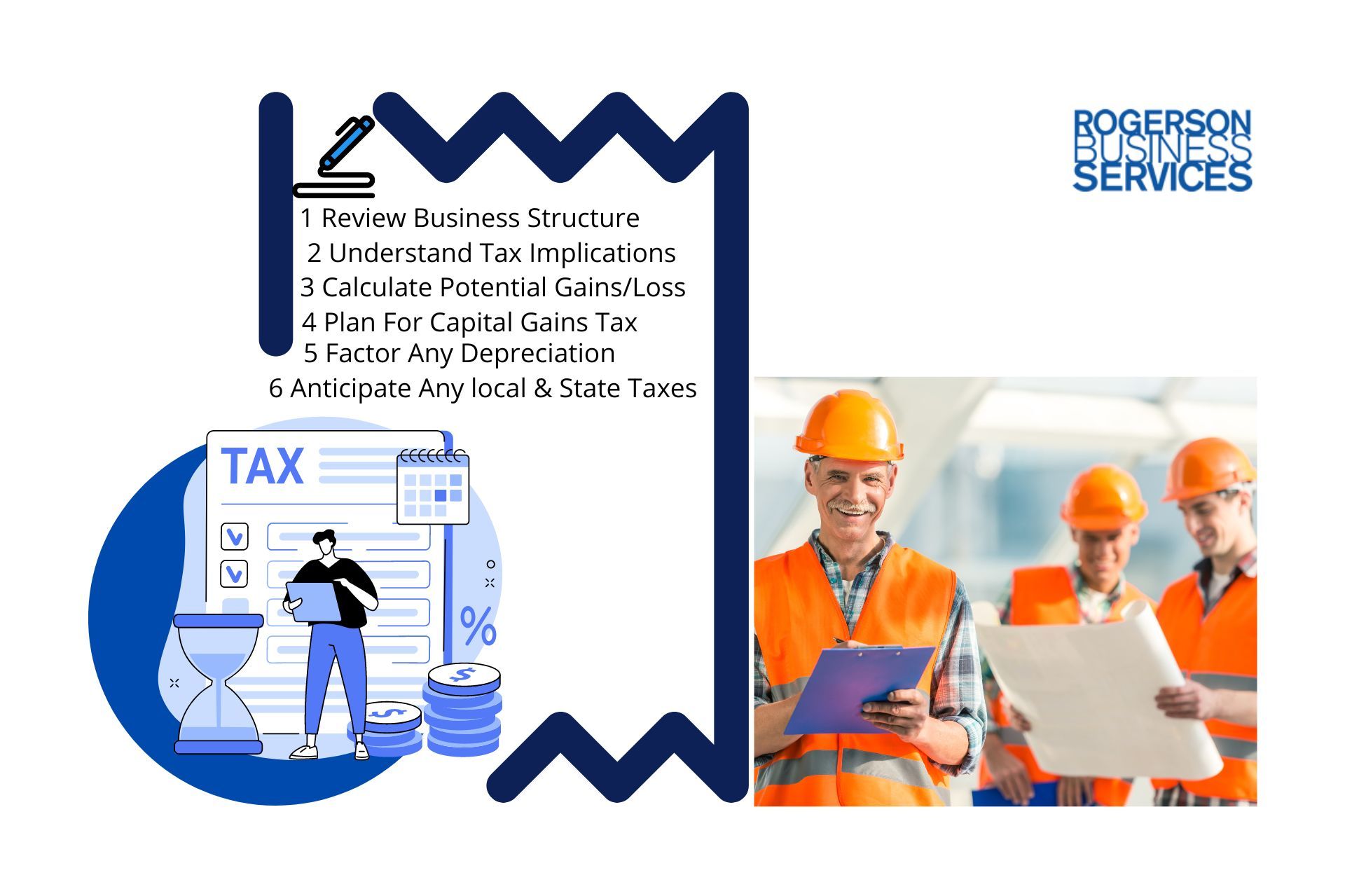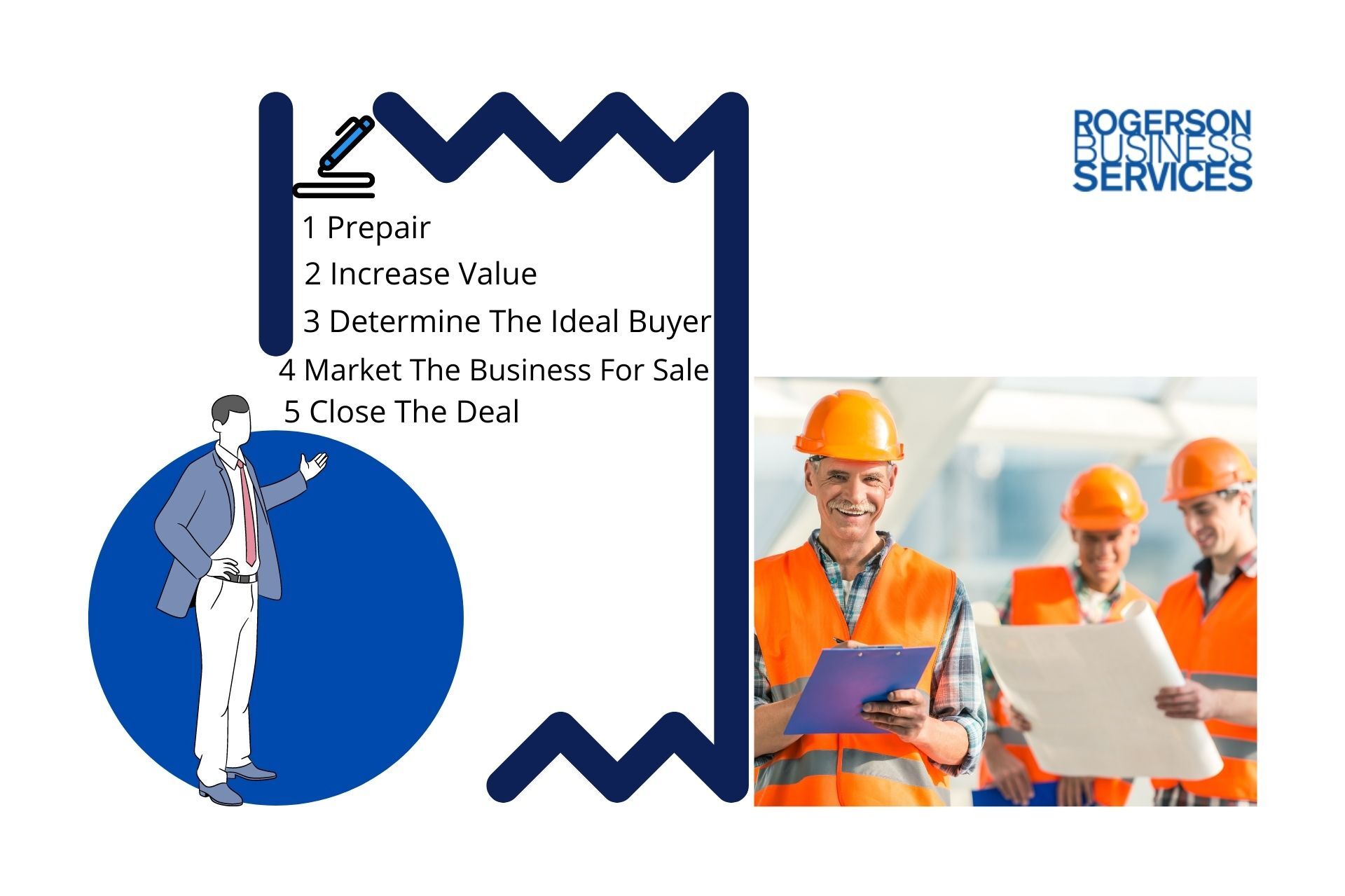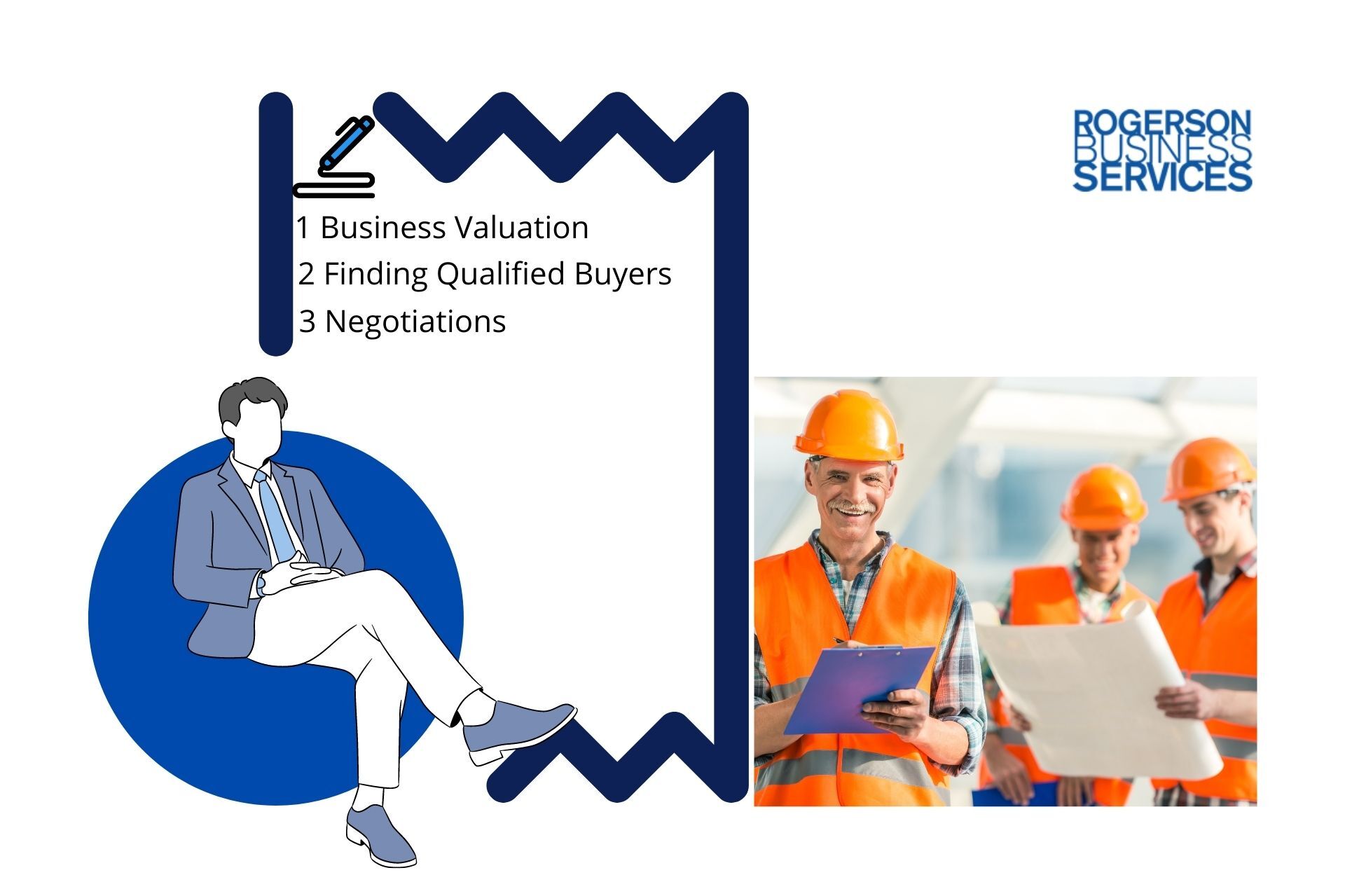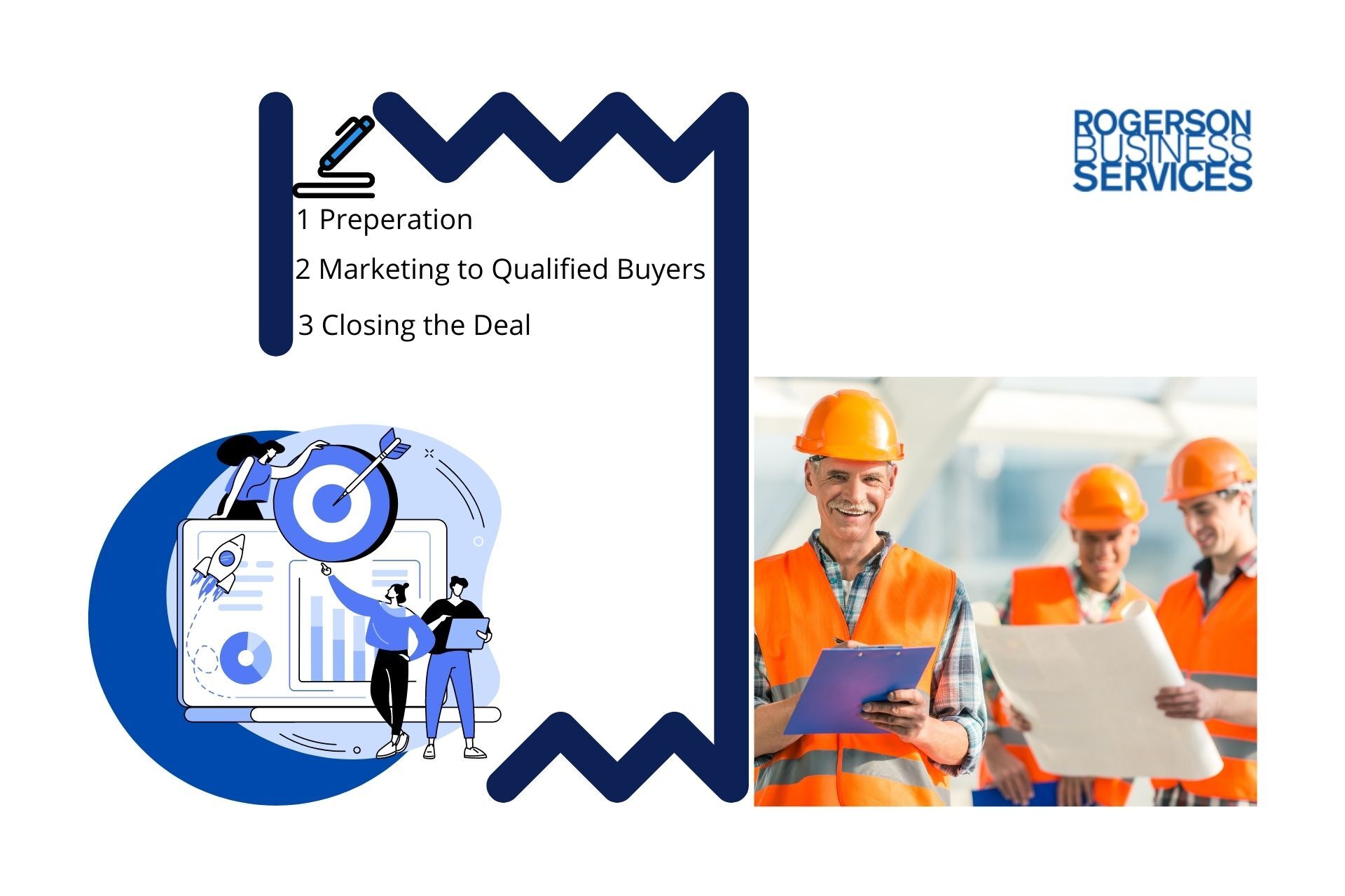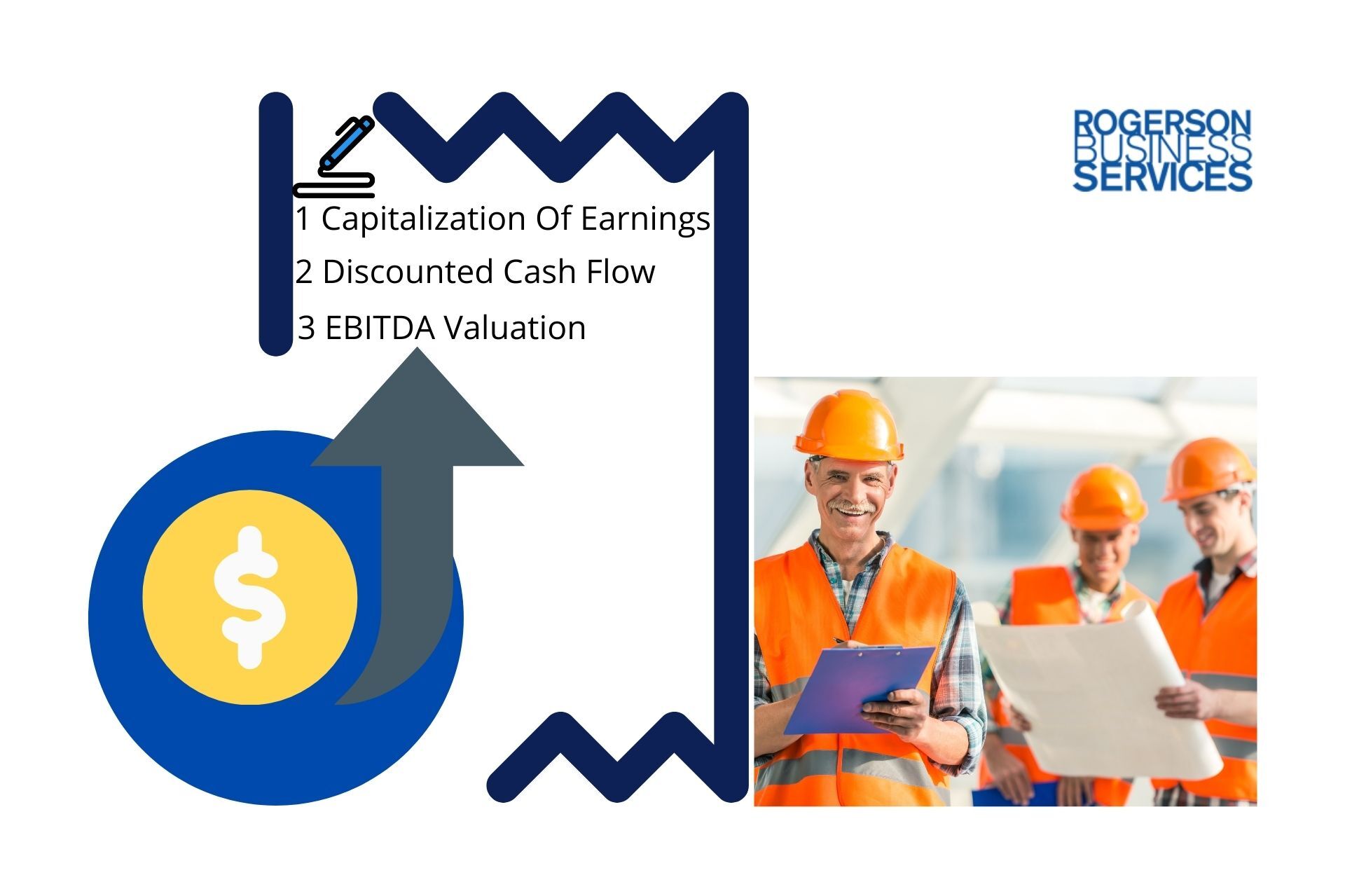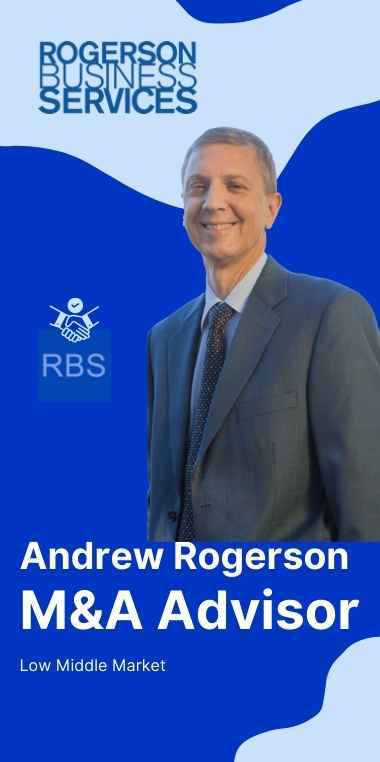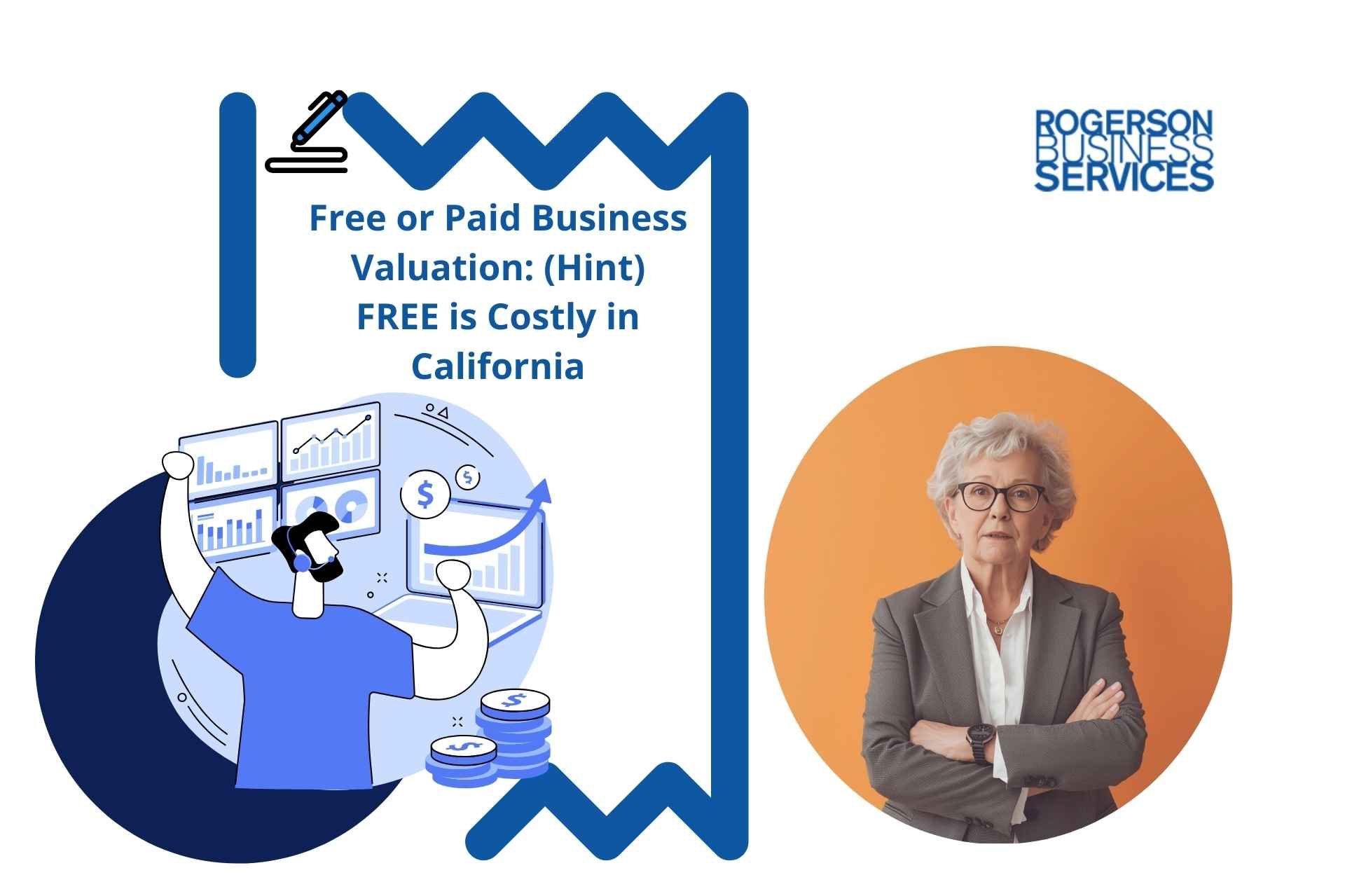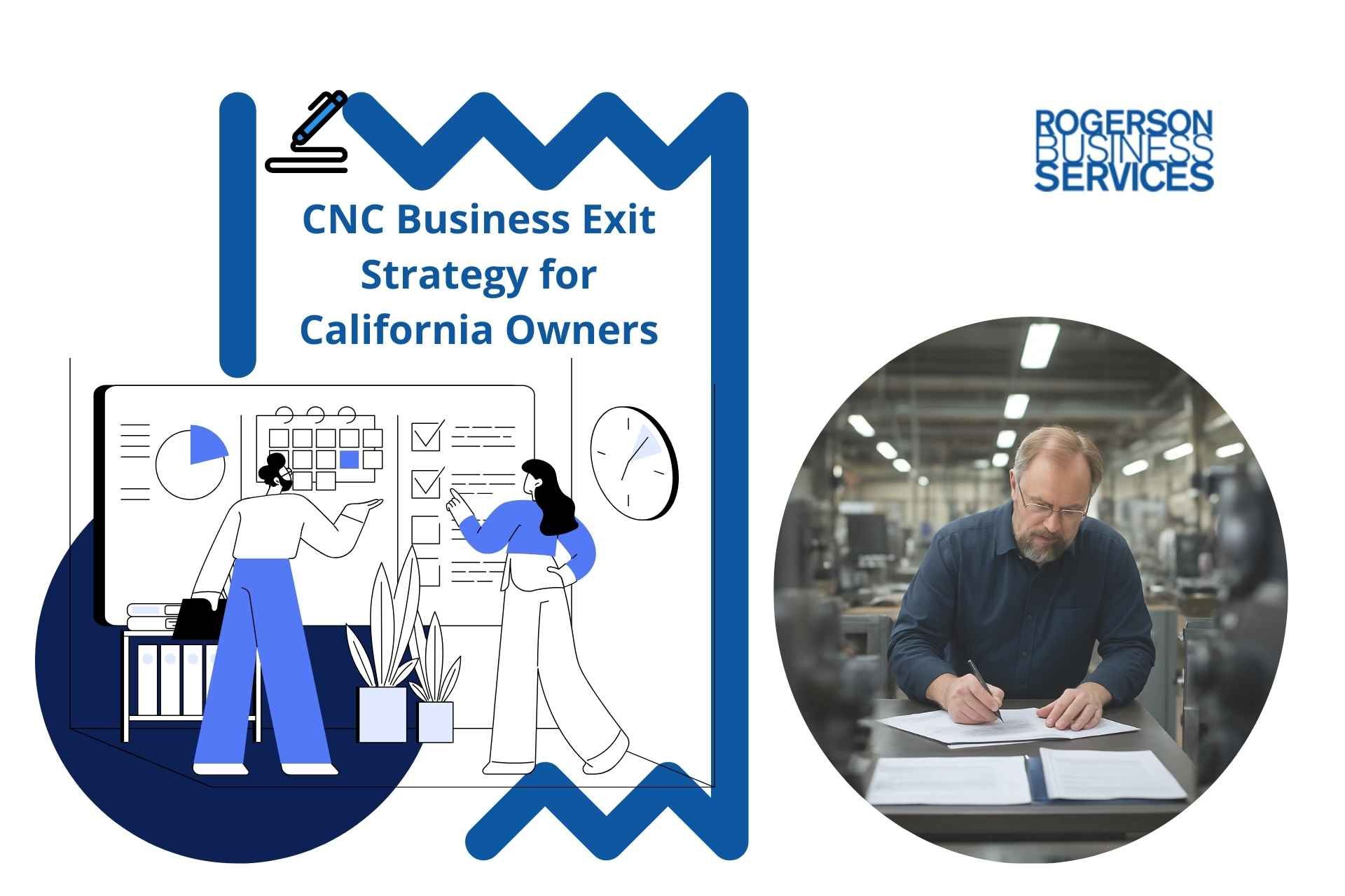The Ultimate Guide To Help Sell a Construction Company
Considering selling a lower middle-market construction company in California can be overwhelming. Without a proper, well prepared, exit plan, and a middle market business broker to facilitate the process, there is no way to guarantee that you made the right decision.
Get The Guide
M&A Guide
Increase Your Chance Of Success!
Guide to Help Exit a Construction Company
Everything you need, all in this sell a construction company guide
Sell a Construction Company Guide
Table of Contents
Exit Strategy for a Construction Company
With over 28 million small businesses in the hands of Baby Boomers, experts anticipate that many will change hands in the next few years. Gen-X and Millennial entrepreneurs are looking to buy mainstreet to low middle-market companies. So, as Baby Boomers consider their futures, they can look to exit strategies before listing their California Construction company for sale.
Baby Boomer Business Owners
Baby Boomers Business Owners are at or near the traditional retirement age. The generation was born between 1946 and 1964, and they’ve spent years building their businesses. They are a proud generation with an exceptional work ethic. Therefore, it’s easy to see why many struggle with the idea of selling their life’s work to someone younger with different ideals.
Entrepreneurship fits the traits of many Baby Boomers, especially their independence and dedication to success. As Baby Boomers approach retirement, the possibility of exiting the business may defy all they’ve done over the years. Some Baby Boomer entrepreneurs considering selling or closing a business as being akin to failure.
Rather than seeing exit strategies as failures, Baby Boomers should consider the lower middle-market business's lifespans. They should consider why they created the business initially, hopefully, to consider the business as a nest egg they could use toward retirement. To get the most out of a construction company for sale, having an exit strategy matters.
Why Develop an Exit Strategy
Exit strategies give business owners the framework to transition their companies to other investors, owners, or their next of kin. The exit strategy framework depends on dynamic market conditions so that business owners can reap the most value from their construction companies for sale in California.
Strategic Questions
Business owners often have questions about why they need an exit strategy and how it can help them sell their business. Those questions include:
- I want to sell my construction business; where do I start?
- What do I need before selling my construction business?
- Do I need to learn how to value a contracting business?
- How much is my construction business worth?
- Who can help me learn how to prepare an exit strategy?
- How difficult will selling my electrical contracting business be?
- What is the future of the construction industry?
- If I sell my business, how much tax will I pay?
- How much can I sell my business for?
- Do I want to sell my business?
- How do I sell my business?
- How do I sell my business privately?
An M&A Advisor can answer all of those questions and help with every step of crafting an exit strategy for selling a construction business.
Business exit-strategy planning matters as company owners need to know all their options. With a strong exit plan, business owners can get the maximum value of their life-long work. Business owners need to understand why an exit strategy matters, especially in the commercial construction sector.
Financial Opportunities
A thoughtful exit plan is akin to a financial plan, as the purpose of the exit strategy is to attract investors or new owners. Middle market M&A Advisors create exit plans with the goal of financially benefiting their construction-business clients. The plan should reduce the pains of considering confidentially listing a construction business for sale.
Opportunities occasionally arise when least expected. Your business exit strategy prepares you for any financial opportunities that come your way. If your business is doing well and a buyer or investor notices, your M&A Broker can accept offers even before you put your private business for sale.
Crisis Planning
Baby Boomers aren’t the only generation of entrepreneurs who need exit strategies. An unexpected health or family crisis can bring about the need for major change. Having an exit strategy helps keep the business from being damaged and lowering its value.
Preparation for Market Changes
As the market moves, construction business valuation moves, too. With a well-crafted M&A exit strategy, business owners can be prepared for unexpected offers. Having a plan on your side lets you take charge of your future and the future of your business.
Added Choices
An exit strategy gives company owners options to present to buyers. Without an exit plan, entrepreneurs looking to sell might unknowingly accept a low offer because they did not work with an experienced M&A Advisor to maximize their returns.
Entrepreneurs would not start a business without planning, and they should not sell one without it, either. Businesses with exit goals can work toward achieving them through strategies and mission statements. The ultimate goal is exiting the business and getting the highest possible value from investors who want to add to its lifespan.
Tax Responsibilities
Every business owner knows that they have tax responsibilities, and many of those responsibilities come due when exiting the business. With an exit strategy, business owners understand their implications for offering mid-market companies for sale. An M&A Advisor can analyze and assess tax implications based on current laws and market dynamics.
With tax responsibilities available in advance of offering a business for sale in California, business owners know what their expenses will be before any deals and agreements.
Business Valuations
Another reason to embrace an exit strategy is to get a proper valuation of your business. While estimating the value a construction company has, a lower middle-market M&A Advisor can help you discover your business's strengths and weaknesses. Then, before offering your business for sale, you can strengthen the weaknesses and improve its value and maximize returns.
Minimizing Disruptions During Transitions
Transitions are often thought of as being disruptive. But with proper exit planning, they can be smooth and efficient. Whether the transition is to a new group of buyers or investors or your next-of-kin, having a plan will make the exchange manageable. Responsibilities and financial obligations are clearly explained to all involved parties.
Weathering Storms
Exit plans can also help businesses survive when the economy dips. If the economy slows for several quarters, the business could struggle. With an exit strategy, infrastructure construction companies can prepare for all things to come. While it is difficult to predict the future of the construction industry, an exit strategy can prepare for most events.

How to Sell a Construction Business
In the construction sector, M&A Advisors can help you prepare and list your lower mid-market businesses for sale. They can do it in a way that meets your needs, whether you want it visible on the open market or listed confidentially. The mergers and acquisitions in the construction industry have unique needs that an experienced M&A Advisor understands.
Preparing to Put Your Construction Company for Sale
Before listing your established business for sale, you have several questions to answer. Most of the questions apply to the construction market outlook and whether you should keep your business or list it. The questions to answer include:
- Does it make economic sense to list your construction firm for sale?
- Will I make more money continuing to operate the business on my own?
- Is the present value of the future dividends or distributions greater than what I’ll pay the M&A Advisor, fees, and taxes?
- What should I do with the proceeds of the sale?
- Will rate of return will the proceeds pay?
- Do the other owners and investors approve of listing the construction company for sale?
Understanding the Types of Construction Contractors
The construction industry includes a variety of contractors and company types. All are needed to complete building projects. These tend to be individuals or organizations contracted for projects like building and finishing individual homes or small business facilities. They include:
- General Contractors
- Small renovation contractors
- Remodelers
- Windows and walls
- HVAC and energy efficiency
- Plumbing
- Electrical
- Excavation
- Finishing, like painting and drywall
- Landscapers
Owners of construction companies often need lower middle market advisors to list their companies for sale. These types of construction industry professionals work with the financing and planning of projects. They include businesses like
- Owner-builder
- Real-estate developer
- Professional construction manager
- Package builders
- Sponsor builders
Contractors and construction companies work in a variety of types of construction. Before investing in an existing business for sale, buyers want to know what type of construction they do. Those types include:
- Residential Building
- Institutional and Commercial Building
- Specialized Industrial Construction
- Infrastructure and Heavy Construction
Due Diligence Checklist for Selling a Business
Preparing to sell a business involves more than putting a for-sale sign in the window. Your M&A Advisor will give you a buying-and-selling-a-business checklist with all of the necessary due-diligence documents. Sellers use the documents to work on the business valuation, and buyers use the documents to decide if the business is worthy of their investment dollars.
Access to Operations Documents
The M&A financial due-diligence checklist includes several important documents. You will need to figure out if you have access to financial documents from the current year and past several years.
The operations documents include other necessities like leases, licenses, contractor information, and employee details.
Data Systems for Documents
The documents needed to sell a business could be housed in a data system. M&A Advisors can use a tool like Sharefile to protect these documents and only make them available once a buyer signs a Confidentiality Agreement or NDA. Documents to manage and protect and only show potential buyers how the construction business for sale records vital information at the right time include recent financial statements, payroll registers, invoicing information, maintenance records on heavy equipment, and customer lists.
Details about EBITDA
Construction companies for sale need to be able to show potential investors their EBITDA details. These include the key add-backs and adjustments to the income statement. EBITDA means Earnings Before Interest, Taxes, Depreciation and Amortization.
Taxes and Consequences
Before listing your business for sale confidentially, you should have a reasonable idea of what your taxes and consequences will be after the sale. Your M&A Advisor can help you find opportunities to maximize your returns.
You do not want all of the profits from the sale to go to the government, and your M&A Advisor can give you a financial due diligence checklist so you have a realistic understanding of how much money you will have after the expenses from the sale.
Determining the Value of Your Construction Company
The M&A strategy for selling your business also includes a detailed valuation. Your M&A Advisor will look at engineering and construction industry trends as well as construction company valuation multiples. You can look closely at the numbers your M&A Advisor presents before deciding whether to sell your business.
Factors Affecting Business Valuation
Whether you are planning for succession or for listing your business confidentially, you need to know what your construction business is worth. Your M&A Advisor has several tools to use when valuing the business. Having a realistic number gives you a better idea of what proceeds you can expect after the sale and fees.
Your M&A Advisor has three primary valuation techniques to use.
Market-Based
After doing market research, M&A Advisors can efficiently figure construction industry values. Your M&A Advisor will look at similar businesses that have recently sold to determine the value of your business. They use other businesses to have accurate multiples of sales as well as other necessary metrics.
The market-based approach can be difficult to do because many businesses are sold confidentially. This could leave your M&A Advisor without access to comparable businesses to use to determine your business’s valuation but there are private databases that sell this information that your M&A Broker subscribes to get an accurate business valuation for you.
Asset-Based
In the asset-based approach, your M&A mid-market Advisor will look at the Fair Market Value of the assets in your business. They must follow the construction company valuation rules when assessing the value of assets.
For construction companies with significant equipment and facilities, such as a highway contractor, the asset-based approach may yield the highest value in a transaction.
Income Approach
The Income Approach may or may not be appropriate for a Construction industry business. Many heavy contractors are required to be the low bidder on many of their contracts, they are often poor candidates for employing an Income-based Approach.
Using your company’s financial documents like the accounts receivable and unbilled contracts, your advisor will be able to figure the cash value of payments due. They will also look at the tangible assets, like heavy equipment and your office building. Your M&A advisor will look at the cost to replace or reconstruct the assets.
Then, the M&A advisor will deduct your business’s liabilities from the value of the assets. The resulting number is the adjusted book value.
The challenge with assessing assets is valuing the intangible assets, like the reputation of the business. Name recognition, loyal employees, and faithful customers can add to the business's value, but it does not have a fixed value. Intangible assets are called “goodwill,” and your M&A advisor will value the goodwill by capitalizing the earnings.
Income-based Approaches value a business by looking to the future earnings or the cash flows expected to generate in the future.
How to Value a Business Based on Revenue
Some Construction industry businesses do not have many assets, so the Income-based approach may be a good option. This technique looks at future annual returns, which are converted into current-value cash flow by discounting the future cash flow with a set rate based on risk. Usually, M&A Advisors use a safe rate of return, with compensation for the buyer/investor.
Your M&A Advisor can also look at the earnings and cash flow from previous years. The M&A Advisor will adjust and capitalize them, and then use EBITDA to measure earnings instead. No matter what, the cash flow needs to be set to a standard that shows the potential buyer their potential return on investment.
The M&A Advisor will normalize the business cash flow by looking at the owner’s draw and benefits as well as other related transactions and extraordinary line items. After determining the average annual earnings and EBITDA or SDE, your M& Advisor will use a rate to show the risk and potential growth. They will also use a Construction industry valuation calculator when needed.
The process of valuing a business is complicated, which is why working with an M&A Advisor is helpful for creating your business owner exit strategy.
What’s Your Construction Company Worth?
Generally, companies are valued based on three numbers: assets, liabilities, and equity. Your M&A advisor knows how to calculate the value of a business for sale using several financial and intangible factors. They include:
- Amount of time in business
- Net income
- Cash flow
- Customers and clients
- Customer acquisition and retainment strategies
- Unique selling techniques
What is Your HVAC, Plumbing, or Electric Contracting Business Worth?
Understand that figuring an HVAC business valuation is different than conducting an appraisal on a business. If you have an HVAC business for sale, you will want someone with expertise in HVAC Mergers and Acquisitions to show you how to list your HVAC company for sale using tools like an HVAC business valuation calculator.
An
HVAC business for sale in California will have different needs and assets than a plumbing company for sale. The same goes for people who have an electrical business for sale. All three types of construction companies often have vehicles as well as necessary tools and equipment, but the financial needs are often different.
M&A Brokers will show you how to sell a plumbing business by assessing the intangible assets of name recognition and customer trust or goodwill. They will look at customer lists, operating history, and other files to determine the value of electrical contractor business or plumbing business for sale.
There are many other types of Construction industry businesses. Especially in California where each discipline is required to have its own CSLB or Contractors State License Board number and a buyer will need to obtain in order to own and operate the business.
Business Valuation
What is it? Why do I need one if I am planning to sell a business? What is my business worth?
The Role of Construction Business Brokers in Selling a Construction Company
M&A Advisors or construction business brokers in the lower middle market segment are expert in achieving growth through Mergers and Acquisitions. Their expertise helps both buyers and sellers, and they are the best professionals to use for selling lower middle-market businesses. They have several tasks to manage while working with businesses for sale in the construction market.
Qualifying Potential Buyers Through Buyer Analysis
One of their most important tasks is to look for buyers looking for growth through acquisition. Potential buyers often include next of kin, employees, single investors, Private Equity Groups, and other types of corporate investors. M&A trends show that several types of acquisition-oriented businesses also look to buy businesses in the commercial construction industry.
Fortunately, M&A Advisors know how to privately share information about private companies for sale without divulging sensitive details about the business because of their experience. Sometimes, competitors end up wanting to buy construction-industry middle-market businesses for sale, so the need for confidentiality matters.
M&A Advisors can maintain confidentiality because some deals do not materialize. If you were to release sensitive details in documents and records, competitors would have that valuable information for free. It is wise to follow the advice of your knowledgeable M&A Advisor to protect your business’s intangibles.
Your M&A Broker knows when to share financials with a buyer and when to ask a seller for their financials. They might ask the buyer to sign a Confidentiality Agreement or a Non Disclosure Agreement before sharing any financial information with them. Before sharing the seller’s business finances, the M&A Broker will vet the buyer by seeing their financial information.
Developing the Exit Plan
Along with vetting buyers, the M&A Broker will also work with the business’s exit plan. They will create and execute the listing in a confidential manner when requested by the owner of the existing business for sale. Once the business is listed, the M&A Advisor will also work on marketing and originating a deal or managing numerous offers and deals.
The M&A Broker is heavily involved in valuing the business to achieve the most accurate value. They look closely at financial records and the efficacy of the intangibles. Once they have the value, they work on a buyer list to find the investor who is willing to make a deal on a profitable business for sale.
The M&A Advisor is focused on creating the exit plan, so they also work hard to maintain the plan’s goal. If something needs to change, your M&A Advisor will contact you to discuss a strategy adjustment.
Originating the Deal
Your M&A Advisor will also work hard to market the deal. Their expertise in Mergers and Acquisitions gives them a reliable list of vetted buyers who might be interested.
The broker will also create a sales package including a Confidential Business Review (CBR) to generate interest for buyers who might jump on the opportunity at first glance. Through targeting and social selling, they confidentially discuss the value of investing in middle-market businesses for sale.
If any of those investors show interest in buying California businesses for sale, the M&A Brokers evaluate their offers. They offer the buyers a market-offer analysis with detailed information about construction industry trends. Your M&A Advisor works to get you the best deal while helping buyers understand the value of your business.
Negotiating with Buyer Due Diligence
Sellers need to participate in due diligence to share necessary information about the business. Sellers need to show many documents to buyers so they fully understand what you are offering for sale. This due diligence shows that your business has been profitable and supports what the seller represents to the buyer.
Before sharing the due diligence, many buyers sign a Letter Of Intent (LOI) as a non-binding agreement about the purchase price and the potential aspects of any deal. Once buyers sign the document, your M&A Broker will share a long list of documents that you need to provide. They include financial documents like:
- Income statements
- Records of accounts receivable and payable
- Balance sheets and tax returns from the last three to five years
- Profit and loss records from the last two to three years
- Reconciled cash deposit and payment records
- Bank loans and letters of credit
You will also need to provide business documents like the seller’s claims about the business, including reasons for selling and details about the business’s reputation. You will also share documents about soft assets like intellectual property and trademarks. Other necessary documents include:
- Partnership agreements
- Lease arrangements
- Utility accounts
- Minutes from management meetings
- Private details
- Information about automated financial systems
- Audit work paper files
- Details about credit and historical searches related to the business
M&A Brokers can give you advice about sensitive information in some documents. For example, your due diligence document package should not include private details about employees, vendors/suppliers, and customers. You should also only provide the necessary details about contracts with employees, other contractors, and clients after the sale of the business closes.
Due-diligence document packages should include lists of assets like equipment, tools, fixtures, and vehicles. Your document package should also include the condition of the assets. If licenses are necessary, the list needs to include details about related business licenses. Your M&A Broker will also share the value of the business so buyers can check on the fairness of the asking price.
M&A Advisors recognize that buyers are hesitant to make offers when there are warning signs in the due-diligence packages. Buyers become uninterested when a due diligence document package does not include the reason for sellers wanting to divest and more. They also lose interest when they are not given financial statements, information about employees, and tax statements.
Other warning signs for buyers include:
- Not agreeing to a reasonable period to conduct due diligence
- Not introducing potential buyers to landlord, or other agents such as insurance companies
- Businesses for sale that are engaged in legal proceedings
- Sellers who want quick closings
- Sellers and businesses with questionable credit histories
Negotiating the Definitive Purchase Agreement
Offering middle-market businesses for sale involves several steps. The
M&A Advisor
works closely with you and your
legal advisor, especially while negotiating and finalizing the
Definitive Purchase Agreement. This Definitive Purchase Agreement helps both parties reach their goals for the transaction and allows no room for error as it completely represents the legal wishes of each party.
A
good M&A Definitive Agreement
is the lynchpin of a good transaction. Both seller and buyer exchange a large amount of information from different sources. This is often over many months of conversations. These exchanges are then condensed, with their individual interests, as best as possible into the Purchase Agreement.
Items a typical Definitive Purchase Agreement may include:
- Treatment of Shares, Options, and any other Securities; if appropriate to the transaction
- Representations and Warranties
- Covenants
- Solicitation (“No Shop” clause)
- Financing
- Termination Fee (or “Break-Up Fee”)
- Indemnification
- Material Adverse Change (MAC) and Material Adverse Effect (MAE) Clauses
- Closing Conditions
The Definitive Purchase Agreement can have potential pitfalls, so your M&A Advisor needs to keep the communication open with the Buyer and their Deal Team as well as the Seller and their Deal Team.
The M&A Definitive Purchase Agreement also needs to include details about tax obligations and consequences, especially if shareholders are involved.
Avoiding Pitfalls if you have a Buy-Sell Agreement
What if the seller is two or more individuals?
Many businesses have multiple owners or shareholders. Getting an agreement from a majority of the shareholders about selling the business and being willing to accept an offer can be challenging. One of the shareholders may not have any interest in selling the business at all or may want something specific most buyers will not be willing to agree. If this is the case, hopefully there is a Buy-Sell Agreement in place as this will outline what each shareholder needs to do. A few years previously I had a transaction with 9 shareholders. One shareholder with a minority interest initially refused to sell. Eventually they changed their mind but it was stressful while this played out.
If no Buy-Sell Agreement is in place and there is tension between the owners and shareholders, the pressure to decide the future direction of the business may be challenging. This article provides additional information for an owner or shareholder with
how to avoid buy-sell agreement pitfalls. To help their clients, M&A Advisors should understand the importance of assumption of liability, so their buyers and sellers know who is responsible for any lingering claims.
The agreement also needs to have information about indemnity clauses regarding operations. For Construction Companies, concerns about environmental liability, breaches of warranties, and other issues need to be factored into the indemnity clauses of a Definitive Purchase Agreement.
Buy-sell agreements can be confusing, so it is helpful to learn
how to understand buy-sell agreements
and
how a buy-sell agreement can save a business.
Buy-Sell Agreement Benefits
A buy-sell agreement benefits both the buyer and the seller, as well as other stakeholders like vendors, employees, and partners. These legal documents act much like an insurance policy for the people involved in a business transaction. Buy-sell agreements can protect the people who start a new business or buy an existing business in the building industry.
A legally binding buy-sell agreement also offers protection when bringing a new partner to the table and protecting the business if one of the stakeholders dies before money changes hands. A well-crafted agreement services the company by being prepared for changes in laws, technology, and other stressors and strains on the industry.
Your M&A Advisor understands
the legal intricacies of buying and
selling a business in California. A unique aspect of California real estate law is that businesses must have
escrow in place
before the sale is completed. By specializing in local business mergers and acquisitions, Rogerson Business Services understands the intricacies of the state’s requirements.
Negotiating the Terms
Your M&A Advisor will negotiate the terms of the sale and include them in the buy-sell agreement. At this point, the buyer knows you have an emotional attachment to the business and have priced the deal with that in mind. They also know that the seller values the down payment and cash they will receive.
As the deal moves closer to the close, the buyer knows that there are still opportunities to negotiate. At this point, the M&A Advisor is necessary because they do not have an emotional attachment to the business or its assets. They will keep the negotiation moving to get the terms set and the deal closed.
Finalizing the Contract
The M&A Advisor will finalize the contract by checking that all required documents are completed and shared. They also check that all required legal documents are completed, so new liens will not be placed on the business. Once the contract is set, the sale can close.
Closing the Deal
At this point, the M&A Advisors have checked the documents, followed laws, and prepared the buyer and seller for the transaction and transition. The M&A Brokers will facility the translation, so the transition is as smooth as possible.
Once the deal is finalized and closed, the M&A Advisor makes sure that proceeds are distributed properly to the seller. They also ensure that the buyer has access to vital information like employee records, customer contracts, and vendor details.
Learn how to plan an exit for your construction company
Sell-Side M&A
Four step process to market your California lower middle market business for sale
01 Exit Plan - business valuation
Your potential buyers can come from many areas. Employees, individual and group investors, Private Equity Groups, and even competitors who may have an interest in purchasing your business. If a competitor is interested, you don't want to reveal too much information about your business, especially anything that could hurt your business if the deal falls through.
Once you decide to sell, get your business ready, and get help from a trusted and accredited California M&A Advisor.
An M&A Advisor will vet potential buyers to make sure they are qualified and are serious about purchasing your business.
A California Licensed M&A Advisor knows the ins and outs of selling a California business and can help you get your business in shape to get you the best deal.
02 Buyer Analysis
One of the first things your M&A Advisor will do, is help you to create an exit plan. An M&A Advisor knows exactly how to plan an M&A exit strategy. In fact, you might get a M&A Advisor to help you with an exit plan long before you're ready to sell your California company.
An M&A Advisor is knowledgeable about how to calculate the value of a business to sell and will aim to get the highest value for your business. Once everything is ready to go, they'll list your business for sale. An M&A Advisor will be an expert at listing a California businesses for sale.
After your business is listed, the M&A Advisor will handle all the marketing of your business to promote deal origination and get you in front of potential buyers. They'll also set a buyer list and work with you to figure out who to go after for the best value.
03 Deal Origination - marketing
An M&A Advisor will then work to get you as many qualified and motivated buyers of your business as possible.
They will market your business through the proper channels, including social selling and targeting and generating interest. They'll vet and follow up with interested buyers whether off-market or publicly listed.
Once the offers come in, your M&A Advisor will evaluate all offers and conduct market offer analysis to make sure you're getting the best deal.
04 Negotiation & Closing
Buyer Due Diligence
Once a buyer is performing their own due diligence, the M&A Advisor will help you navigate the process to make sure everything is running smoothly. They'll negotiate a Letter Of Intent between you and the buyer to lay out the proposed aspects of the deal. Your M&A Advisor will also help you gather all of the necessary paperwork discussed above. If the buyer asks for additional documentation, your M&A Advisor can help guide you.
As a buyer is going through the due diligence process, they will be on the lookout for red flags about your business. An experienced M&A Advisor is knowledgeable about these warning signs and can help you prevent them. Red flags may include refusing to disclose why you're selling, not allowing time to conduct due diligence, refusal to introduce the buyer to employees, suppliers, landlords, and more.
Definitive Purchase Agreement
The M&A Advisor will oversee the Definitive Purchase Agreement with the help of the transaction attorneys to make sure both parties are happy with the terms. A Definitive Purchase Agreement protects both you and the buyer as it will clearly state exactly what is and is not being sold. It can also protect the buyer from certain liabilities. A Definitive Purchase Agreement will also help you deal with the legal complexities of selling a California lower middle market business.
Once the Definitive Purchase Agreement is finalized, the M&A Advisor will help with any final items that need to be done as part of the closing process including working with a California Licensed Escrow company.
Closing - Finalize the Transaction and Close the Deal
Finally, your M&A Advisor will help prepare the close of your transaction. Once the closing is complete, they'll assist with overseeing the transition of the business change of ownership.
Problems in Growth Through Acquisition
Following a growth acquisition strategy can cause several pain points. M&A Advisors can help you reduce those problems and have an easier transition. For buyers, absorbing a new firm can have several issues, like miscalculations during the transition because of issues with due diligence and matchmaking problems.
Other pain points during the acquisition process include issues with previous management and workers. If some of the management stays the same from the selling company, employees may begin to worry as any changes they were told by the buyer are different to what they are seeing and hearing. Clients might also notice these problems and become reluctant to remain with the transitioned business. This includes acquired clients might not choosing to renew their contracts because of the changes.
Employee-management problems can also arise when merged businesses have different working cultures. To make matters worse for the buyers, some sellers take their finances and intentionally invest in competing businesses or build a new competing business.
M&A Advisors can help ease these pain points through negotiations. Definitive Purchase Agreements can include details about how sellers use their proceeds. They can also include details about employee relations, rates of pay, employment conditions and other risk factors that if properly considered, enhance the value of the business the buyer is acquiring.
Need help with valuing & selling your manufacturing business?
Rogerson Business Services (RBS) is an M&A Advisory for lower middle market businesses built on trust and ethics. Andrew Rogerson, Certified M&A Advisor, can help you find answers to all your questions, introduce you to better opportunities, and manage the buying and selling a construction company in California process's integrity while keeping every aspect of sales confidential.
M&A LOWER MIDDLE MARKET ADVISORY
Why Work With Rogerson Business Services?
Business Valuation
Many sellers neglect the business valuation and methodology early in the process, only to become frustrated after the deal has been finalized. Rogerson Business Services can help you understand the value of your business based on different methodologies.
Legal Due Diligence
When selling a business, the legal standing of the business determines the smoothness, efficiency, and speed at which the transaction is finalized. M&A Advisors offer a sell-side M&A process backed by the viability of a California Licensed business or transaction attorney. With a licensed California M&A Advisor, you can be certain the legal documents involved in the sell-side M&A process is detailed and accurate.
Business Analysis
To avoid wasting time with unqualified buyers, get help from a trusted, licensed, and accredited California M&A Advisor. An M&A Advisor will vet potential buyers to make sure they're legitimate and are serious about purchasing your business. An M&A Advisor knows the ins and outs of selling a lower middle market business and can also help you get your business in shape to get you the best deal.
Financial Due Diligence
Our service includes deal team professionals to assist you. From financial to legal documents to tax and procedures, we want to make sure you are covered.
If you have your own in-house team of M&A Brokers, Rogerson Business Services can help make the M&A sell-side process as easy as possible by offering insights that help the team understand and are in alignment with the same goals as yours.
Definitive Purchase Agreement
The Definitive Purchase Agreement is usually extremely complex. It is easy to overlook all the terms and legal jargon, but every paragraph is important and duly considered. It is therefore critical to ask questions and ensure you are comfortable with the final set of legal documents you need to sign.
M&A Sell-Side Targeting
Rogerson Business Services provide Mergers & Acquisition M&A Sell-Side Advisory. We zero target off-market, accretive, private equity and strategic buyers with an interest in lower to middle market companies or businesses to maximize incremental growth value.
Conclusion
Selling a business is a challenge. The sheer number of transition documents, potential pitfalls, and pain points prove why it is important for sellers and buyers to work with a professional M&A Broker. These professionals can help sellers create an exit strategy that works for them to sell their businesses at a reasonable price.
An M&A Advisor understands the legal requirements for selling a business in California. They also understand the unique needs of construction companies for sale. They can tell you if it is the best time to sell your construction business based on commercial construction trends.
Even if you don’t own one of the biggest general contractors in the US, you should still work with an M&A Advisor to get the best deal on your construction company for sale in California. When you are ready to develop your exit strategy and to transition your business,
Rogerson Business Services in the lower middle market M&A segment
can help you through all of the steps.
Need help maximizing your construction business value before selling?
Rogerson Business Services (RBS) is an M&A Advisory for lower middle market businesses built on trust and ethics. Andrew Rogerson, Certified M&A Advisor, can help you find answers to all your questions, introduce you to better opportunities, and manage the buying and selling a construction company in California process's integrity while keeping every aspect of sales confidential.
FAQ's
Sell-Side M&A
Sell a Business
Business Valuation
Ten Reasons to Plan a Business Exit Strategy with
Rogerson Business Services
1. Ethics
Rogerson Business Services are members of the M&A Source, International Business Brokers Association (IBBA) and California Association of Business Brokers (CABB) and adhere to their code of ethics.
2. Confidentiality
Rogerson Business Services assists you professionally in a highly confidential manner to protect your personal and financial details.
3. Vetted businesses for sale
Rogerson Business Services have access to an inventory of businesses including unlisted businesses for sale in California.
4. Facilitator
Rogerson Business Services are specialists in business transitions and understand the need to respect all parties in the transaction. There are many steps to value, sell and buy a business. Rogerson Business Services have successfully navigated these steps many, many times.
5. Valuation
Rogerson Business Services can provide you an opinion of value of a business you wish to sell or buy.
6. Due diligence and escrow
Rogerson Business Services has the knowledge to work through leases, franchise agreements, finance requirements, licensing, California escrow requirement and many other items so the sale of a business is successful.
7. Negotiation
Rogerson Business Services practice win/win negotiation skills. Negotiations are rarely perfect and so a win/win approach is the best way forward.
8. Financing and funding
Rogerson Business Services has professional lenders that can assist with finance to successfully buy a business.
9. Resource
Rogerson Business Services is an active member in the associations of the M&A and Business Broker industry including M&A Source, the International Business Brokers Association (IBBA), California Association of Business Brokers (CABB), International Society of Business Appraisers (ISBA) as well as other professional organizations.
10. Closing and transfer
Rogerson Business Services works with you each step of the way. This includes managing the buying or selling of your business through initial negotiations, due diligence, escrow and the all-important closing.
We built this amazing step-by-step-guide to help "Exit a Construction Company" - it is yours (free)
Rogerson Business Services provide Mergers & Acquisition M&A Sell-Side Advisory. We zero target off-market, accretive, private equity and strategic byers in lower middle market companies or businesses to maximize incremental growth value.


